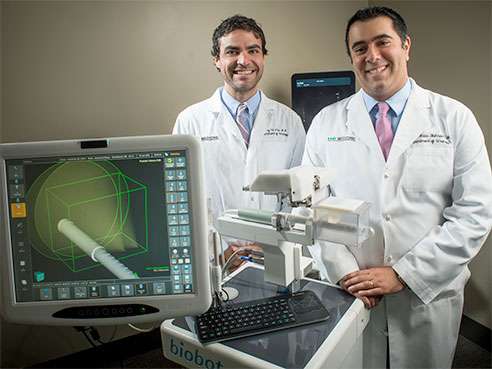UAB receives cutting-edge robot to diagnose and support treatment of prostate cancer

The world-renowned iSR'obotTM Mona Lisa makes its way to the United States, providing urologic surgeons with a tool to diagnose prostate cancer earlier through accurate diagnosis and precise localization that may allow for targeted treatments in the future.
The University of Alabama at Birmingham is one of two beta sites in the United States to receive this new image-guided system. Lead investigator Soroush Rais-Bahrami, M.D., will determine the utility of the equipment for potential clinical use in the setting of the UAB Urologic Oncology Innovations Lab through a pilot pre-clinical project, "Phantom-Based Evaluation of a Novel Trans-Perineal Platform for Prostate Cancer Detection and Treatment."
"As the only hospital in the Southeast to have the Mona Lisa robotic device, our team's input on the device will help shape the future of prostate cancer diagnosis and treatment, not only for our patients at UAB but also patients worldwide," said Rais-Bahrami, assistant professor in UAB's Department of Urology and Department of Radiology. "Our feedback will help modify and make the already successful robot better as it launches in the United States for research and clinical implementation."
The Mona Lisa robotic platform created by Biobot Surgical uses magnetic resonance imaging and ultrasound fusion techniques to robotically guide biopsy of suspicious lesions. The fusion software helps with the localization of the needle when a biopsy procedure is performed, providing pinpoint accuracy. With UAB investigators, the device is being further developed to plan for minimally invasive focal therapy for treating prostate cancer in the future.
Ultimately, the Mona Lisa will be used for focal or targeted therapy through image-guidance and treatment localization for prostate cancer. More than a thousand patients across Europe and Asia are already receiving biopsies with the Mona Lisa robotic device.
"In the United States, we are currently treating the entire prostate for cancer," said Jeffrey Nix, M.D., assistant professor in UAB's Department of Urology. "We have the capability to fuse MRI and ultrasound to identify the exact location of the cancer. We are excited about providing personalized care for each of our patients and look forward to the day that we can administer localized treatment with the use of the Mona Lisa."
The Mona Lisa is being integrated as an investigation by a multidisciplinary team founded and co-directed by Drs. Rais-Bahrami and Nix. The UAB Program for Personalized Prostate Cancer Care combines experts from urology, radiology, radiation oncology, medical oncology and pathology to determine the best treatment pathway for each individual with prostate cancer.
UAB investigators are using phantom studies and 3-D personalized molds of prostates to prove the principle that biopsies with spacial accuracy of certain targeted regions can be performed.
After Biobot receives approval from the United States Food and Drug Administration for the MRI-US Fusion software, UAB looks forward to beginning clinical trials that biopsy-qualified prostate cancer patients could benefit from the use of this device.
Biobot Surgical and BK Medical Systems provided support for the evaluation of this equipment.

















